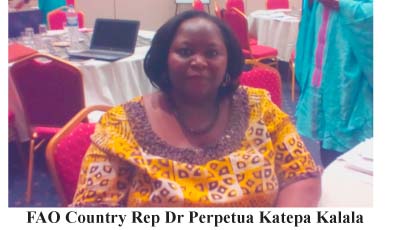
The
FAO Country representative in The Gambia, Dr Perpetua Katepa Kalala, has said
the Gambia government recognises women’s empowerment as key factor for the
attainment of social and economic development.
As a result, a number of measures have so far
been taken to mainstream women in the development process.
The
FAO official was speaking at a training workshop on gender mainstreaming in
agriculture, jointly organised by the Ministry of Women’s Affairs and FAO
country office and the regional office for Africa on the theme: “Gender
mainstreaming for inclusive agricultural growth”, held at the Kairaba Beach
Hotel.
The
FAO representative added that the Gambia government had “successfully achieved”
empowering women in agricultural production and value chains over the years.
“This
is a catalyst for further accelerating inclusive agricultural growth that
equally benefits women farmers, food processors, traders and agribusiness
owners alongside men and youth in agricultural value chains.”
She
spoke of the establishment of the National Women’s Council and Bureau by the
Council Act of 1980, consisting of women representatives from all the districts
in the country with the Women’s Bureau serving as its executive arm.
“A
National Policy for the Advancement of Gambian Women (NPAGW 1999-2009) was
formulated and provided a legitimate point of reference for addressing gender
inequalities at all levels of government and all stakeholders.”
A
review of the NPAGW in 2006, however, came up with a policy shift from women’s
development perspective to gender and women empowerment orientation with a
rights based approach.
In
this regard, she continued, the policy was shortly followed by formulation of a
Gender and Women Empowerment Policy 2010-2020, resulting from wide consultative
process that spanned national, regional district and community levels.
“Women
farmers play a vital role in food production and food security. They account
for 70 per cent of agricultural workers, 80 per cent of food producers, those
who process basic foodstuffs and they undertake from 60 per cent to 90 per cent
of the marketing.”
Notwithstanding,
these facts, their access to productive resources and employment opportunities
remain limited, holding back their capacity to improve their lives and to
better contribute to the economic growth, food security and sustainable
development of their communities and countries, “ she further stated.
The
FAO official added that understanding and responding to the gender dimensions
in agriculture, food security and nutrition is both a challenge and an
opportunity for development.
She
said there is a growing body of evidence indicating that addressing gender
equality and women empowerment in agricultural planning, programming and
budgeting could lead to greater food security and improved performance of the
agriculture sector and the food value chains.
The
Executive Director of Women’s Bureau, Binta Sidibeh, speaking on the occasion,
said significant strides had been made over the years in the promotion of
gender equality and equity.
The
lack of adequate human resource capacity continues to undermine the effective
participation of women in the development process as well as efforts to
institutionalise effective gender mainstreaming at all levels of society.
She
noted that if they are to succeed in their fight for gender equity and equality
they should give priority to services building of state and none-state
institutions to better provide gender responsive services delivery.
“We
would bring about attitudinal changes for sustaining the fight against gender
disparities and inequalities, but would also empower women and men to make
informed choices and decisions concerning their lives and society in general.”
Read Other Articles In Article (Archive)


